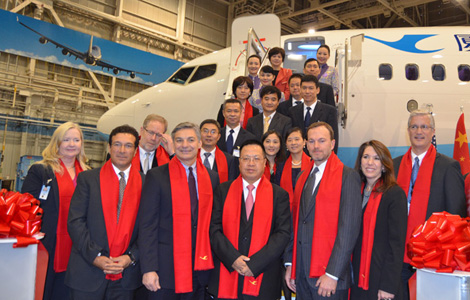Communique reveals long-term goals for China's economy
Updated: 2013-11-13 16:11
(Xinhua)
|
||||||||
He also maintained that the disappointment was that there was no new statement pertaining to the reform of State-owned enterprises (SOEs) in China.
However, Qu said a pilot scheme on SOE reforms is expected to be unveiled in Shanghai, as reported by the media. This may include a "share incentive mechanism" as one of the test-reforms.
"We expect this practice to provide the context for a nationwide implementation in the coming years, if not months," he said.
Qu said the communique is still lacking details and quantifiable indicators, but it is important to look for forthcoming details over the next few months, and he remained optimistic.
Peng Wensheng, chief economist of China International Capital Corporation, expected the Chinese leadership to make reforms on SOEs.
One area that should get much attention, Peng said, is that the report said markets would be given a "decisive" role in allocating resources, indicating the country may take further steps to break up state monopolies and reform the SOEs.
China's previous policy statements often described markets as playing a "basic" role in allocating resources.
Although the communique did not announce any bold reform plans for SOEs, it would improve the SOEs' management system to end their dominance in non-critical sectors and ensure they adhere to modern corporate practices, Peng said.
The arrangements would benefit China's longer term economic development, but may cause uncertainties to short-term growth, he said.
Reform plans may also be rolled out to coordinate land policies for urban and rural regions and finally allow rural land transactions, he said, adding that the change would not occur in the short term.
China's rural land, collectively owned by local residents, is divided into arable land and construction land, which is used for rural housing and infrastructure.
Under current laws and regulations, Chinese farmers are not allowed to sell or lease out the plots that are allocated to them. Their land has to first be acquired by a local government before being allocated for residential, commercial or industrial development purposes.
Lu Ting, chief China economist with Bank of America Merrill Lynch, said the communique is a short announcement which sets the tone for a much longer version of the decision.
Lu said the communique clearly said China would deepen fiscal and budget reforms to bring in line fiscal revenue and fiscal responsibilities.
The communique pledged to deepen opening up and promote international corporation and competition. It said China would ease entry of investment, accelerate construction of the free trade zone (FTZ) and expand the opening up of border areas in inland China.
"We think China will use the FTZ as a test ground for reforms and to seek a bilateral investment treaty (BIT) with the U.S. and, perhaps more importantly, to participate in the Trans-Pacific Strategic Economic Partnership (TPP)," Lu said.
Kevin Lai, of Daiwa Capital Markets, said the communique "reveals reform directions in broad terms."
"What is most interesting is how the leadership treats the role of the market now. ... The market will play a 'decisive role' in allocating resources. In the past, it has referred to a 'basic role' for the market only," he said in a research note.
"The change of rhetoric seems to suggest that a consensus has been reached about deepening market-driven reforms while avoiding embracing fundamental capitalistic changes," he said.
The more "decisive" roles played by the market would involve areas such as interest-rate liberalization, moves to remove administrative barriers to private capital and other forms of financial liberalization, Lai said.
He said China's future reforms are going to be the "high-hanging grapes," which will be increasingly difficult to pick, since future reforms will be more about redistribution of income or wealth.

 Graduation celebration for Santas
Graduation celebration for Santas
 One World Trade Center deemed tallest US skyscraper
One World Trade Center deemed tallest US skyscraper
 Xiamen Airlines gets milestone 100th Boeing
Xiamen Airlines gets milestone 100th Boeing
 PANDA! set to debut in Las Vegas
PANDA! set to debut in Las Vegas
 Lest we repeat the horrors of the past
Lest we repeat the horrors of the past
 Haiyan toll rises in Guangxi, Hainan
Haiyan toll rises in Guangxi, Hainan
 US honors its veterans with ceremonies, parades
US honors its veterans with ceremonies, parades
 Carnival season kicks off in Cologne
Carnival season kicks off in Cologne
Most Viewed
Editor's Picks

|

|

|

|

|

|
Today's Top News
World Bank head hails China's reform plan
Renewable energy set to steam ahead
Xiamen Airlines gets milestone 100th Boeing
Alaskan seafood stars in Singles' Day
China and US should focus on the 'big picture'
Leadership charts path
China can curb pollution: UN
China, EU 'to launch investment treaty talks'
US Weekly

|

|




